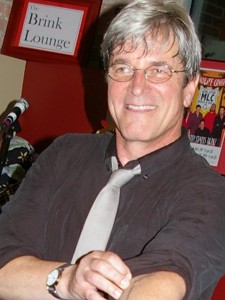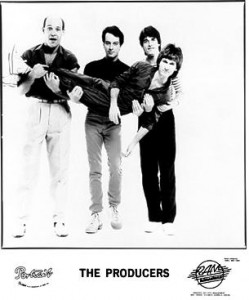 Life Goes On for Former Producers Star Kyle Henderson
Life Goes On for Former Producers Star Kyle Henderson
The trend for most musicians in Madison is to reach some level of recognition and dedication to their craft and then look for more fertile soil to launch a bid at success. Without a structured music industry, the odds have always been weighted heavily against realizing your dreams from Madison. But with the advent of the digital revolution and with the strides made in social networking technology, those limitations and old norms are being shattered. In fact, you could say that the very notion of what is “success” in the music business is being reinvented and retooled for the independent artist who possesses enough savvy to sidestep the usual horrors of assimilation. The revolution may still be in process but it is being televised…only it’s on YouTube and your iPhone rather than MTV.
But MTV is largely what made Kyle Henderson and his Atlanta-based power pop quartet The Producers a success. How he landed in Madison some twenty-five years later is a story of luck, hard lessons, rebirth, reality checks, loss and redemption.
The Luck
Henderson was raised in Indianapolis, the son of two educators. Beginning his musical journey on cello, Kyle was a poster child for the late-sixties/early seventies square. A quote form his bio describes him thusly: “By the time I was in Jr. High, I sang in the school choir, played in the orchestra, denigrated pop music as trash, competed on the debate team, studied in accelerated classes, played no sports and wore my brother’s hand-me-downs except for my brown oxford corrective shoes, which the parents said would fix my flat feet. Plus, I wore a near buzz cut long after other boys wore mop tops and longer. My father said long hair on men was ‘in bad taste.’”
Thank God for the power of rock and roll because Henderson soon found himself being asked to pick up bass guitar and join local bands. He had runs with a series of show bands, eventually relocating to the Atlanta area with one that came to be known as Whiteface. Fans began to pack The Bistro on the city’s north side to catch the funky soul the group regularly offered up and they became the “buzz” band of Atlanta. A prominent Whiteface memory for Henderson is the night Warner Brothers executive Jerry Wexler pulled up in a stretch limo and entered The Bistro to check the boys out as they watched out the upstairs window where they were getting ready to take the stage.
Here’s where the luck comes in. Tom Werman, a CBS/Portrait Records rep who was involved with Cheap Trick, REO Speedwagon and Mother’s Finest, was in the city working on a Ted Nugent album and began to hit The Bistro nightly, becoming acquainted with the band and Henderson. Although Werman loved Whiteface, the band went with Mercury Records to Muscle Shoals Studio to record an album that stiffed badly as it could not compete with another Georgia-based band called the B-52’s. Henderson was 21 when the album was made.
On the first day of 1980 Henderson left Whiteface to join a new band with some friends from Cartoon, a Beatles tribute band. Drummer Bryan Holmes, guitarist Van Temple and keyboardist Wayne McNatt (a.k.a. Wayne Famous) dubbed themselves The Producers and immediately began writing. It was clear there was songwriting chemistry and the tunes began to flow. Eventually Werman came into the picture to hear the new group. Werman was all business but halfway through the first song, “You Go Your Way,” his head was bopping. Before the ten-song audition was over Werman remarked, “We’ll record the first album in November.”
The Producers recorded two albums with Werman on Portrait Records. The debut spawned the single “What She Does to Me” and, more importantly led to a video for “What’s He Got” that became a favorite on the newly-launched MTV. You Make the Heat, the band’s second album spawned the hit “She Sheila” which cracked Billboard’s Top 50. The video for the song was so popular it landed The Producers in the headlining role for MTV’s New Year’s Rockin’ Eve at the end of 1982.
The band was on the doorstep of success as they prepared to take the stage for the New Year’s Rockin’ Eve. But MTV’s Martha Quinn called the band out before the expected time and they were not yet prepared to take the stage. The aftermath found the usually cool Henderson in the face of the band’s road manager, a sign of things to come.
Despite their success, The Producers were dropped after the second album. The band had toured 280 days per year for three years. Henderson recalls life on the road during that time. “We were all married. Keeping that kind of schedule was really hard. Our daily conversations with our wives were usually hour-long conversations where we yelled at each other. We were at a level that allowed us to do that kind of touring and make a living playing music but we were also at a level where we didn’t get much support. We put ourselves up most of the time. We did a lot of touring with The Romantics and who would headline often depended on where we were. When they did “Talking in Your Sleep” and it went to #1, everything changed for them. Not so much for us so that was tough, we never had that big hit. That’s all we lacked and we were all frustrated because we were so close.”
To make matter worse they discovered they had not been paid royalties owed to them and the clause in their contract with CBS allowing them to make inquiries had run out. “The band knew nothing about business,” Henderson says. “The first two records had sold a half-million copies. We should have made good money from the songwriting royalties but we didn’t know they were payable on the first record sold. Somebody got that money but that person’s dead now and we were contractually prevented from recouping anyway.”
Henderson offers this advice: “The reason we were associated with these people [those who would take the band’s royalties, etc.] was because of my previous association with Whiteface. If we had waited a year I wouldn’t have been contractually obligated to that management. My advice is two-fold: First, to the best of your ability, you’ve got to have someone who knows business and you’ve got to be able to trust them.” He laughs and adds, “I can’t tell you exactly how you do that! If there is anything we know for sure it’s that quote from the Brains’ song which Cyndi Lauper made popular and that’s that ‘money changes everything,’ and it does. Secondly, you’ve got to be familiar enough with the business aspects yourselves so that you can recognize the red flags when they arise. Like, ‘Where are our writer’s royalties?!’ It’s not like every member has to have an M.B.A. but it’s about being able to hold others accountable for what’s going on. The narrative of ‘I am the artist, I don’t need to do that, I want to be a bohemian aristocrat’ is a powerful one. The balancing act between doing something because you feel trapped or waiting for the right opportunity is a tough one, too. Be wary of a situation where you feel trapped as we did.”
Disillusioned and burned out, Henderson left The Producers shortly after they were dropped by Portrait.
Rebirth
As one might expect, Henderson was searching for some kind of balance in his life. He turned to Christianity, becoming born again. “Like many people in the music business or art, I was just so sick of life,” Henderson says. “Here I was pursuing what I wanted to do but I was on the road all the time and I was tired of it. Like many other people, Christianity offered something I could commit myself to equally. It was a different kind of “all-consuming” from being the rock star. I just got involved with a community that was self-confirming in that way. I met some great people and still have political arguments with those that are especially conservative.”
 Henderson went as far to record an album of Christian music for Kerygma, a record label headed by Kansas guitarist Kerry Livgren. That album failed miserably as well and Henderson admits that it was not a good move. “Everything about it sucked. The performances, the recording, the mix – hanging out with Kerry was cool, though. I sang background vocals on a couple of Kansas albums, when Steve Walsh was out of the band. “Fight Fire With Fire” was one. I sang on Kerry’s A.D. recordings, too.”
Henderson went as far to record an album of Christian music for Kerygma, a record label headed by Kansas guitarist Kerry Livgren. That album failed miserably as well and Henderson admits that it was not a good move. “Everything about it sucked. The performances, the recording, the mix – hanging out with Kerry was cool, though. I sang background vocals on a couple of Kansas albums, when Steve Walsh was out of the band. “Fight Fire With Fire” was one. I sang on Kerry’s A.D. recordings, too.”
–
–
Reality Check
Henderson’s experience with his immersion in Christianity began to hit a crossroads. “I still consider myself a theist,” he says. “When I was a strong Evangelical Christian I had a list of about 500 things that I believed in absolutely. That list has shrunk to two or maybe three. I moved away from it and that had a lot to do with my oldest son who was troubled from the beginning. The realities just weren’t figuring into that world view of what the promises were. I had to take account of that. I had a couple of options. One was that I was demon-possessed or something; the other was that there was a problem with this interpretation of reality. So the list of certainties began to chip away until it was a very small list of certitudes.”
The experience of making the Christian album and his continuing frustrations caused Henderson to give up on the music business. “It was the pendulum swinging from the sex, the drugs, the rock-and-roll, the debauchery, the glory to ‘I just want simplicity’,” says Henderson. After a time, however, Henderson began to sing again, working for nearly three decades with convention bands. One was the Funk Club, an Orlando-based funk-and-soul band led by Liberty Devitto, Billy Joel’s drummer. The bands did a ton of convention gigs and it was during this period that Henderson’s love for soul music and the blues was embedded. “There is just something about the lack of irony in those types of singers,” he says. “Something about a guy like Otis Redding who just gets up there and says it the way it is. There is something about that straight-ahead passion that I really like. When Roy Acuff sings ‘Whiskey and blood run together but I didn’t hear nobody pray,’ a song about a drunk driver, that’s something that hits me in the gut.”
If there was one thing Henderson’s Evangelical period did for him it was give him cause to read. He began to soak up lots of information and started attending college where he was drawn to journalism and writing. He wanted to edit an editorial page but wound up in marketing and communications.
Loss
In 2007 Henderson moved to Madison with his second wife, taking a job in the UW system doing internal communications for their e-marketing consortium. He earned his master’s degree in Communications at UW-Whitewater while he went through his second divorce. Henderson has been married “two-and-a-half times – the third one we never made official” and is currently unmarried.
His immersion into soul and the blues continued and he put together a band. Kyle Henderson and Blue Eyed Soul began gigging sporadically in the area. “I was no longer trying to make a living playing music,” Henderson says, “and that was okay. My music is my art now, not my job.”
Then in 2009, tragedy struck. Henderson’s eldest son Daniel committed suicide after struggling with depression for most of his life. The incident had a profound impact on Henderson and his music. Songs he began to write came directly from his losses and life experiences. Henderson has a tattoo on his left arm that reads “In memoriam Daniel: loved, wronged, missed 5/28/1987–10/6/2009,” signifying the internalization of that loss.
Redemption
 In the summer of 2011 Henderson recruited his son Ted, also an accomplished musician in his own right; college-educated and poised to work in soundtracks and film, to begin creating the rhythm tracks for what was to become Henderson’s first recording since the 1980’s. Life Goes On couldn’t be a more fitting title for a project that was obviously cathartic and central to Henderson’s grieving process. (You can read our review here.) Ted and Henderson laid all the bass and drum tracks before taking the project to Mike Zirkel at Audio for the Arts. Jimmy Voegeli was brought in to add keyboards and Blue Eyed Soul members Mike Ripp and Alison Margaret contributed guitars and backing vocals, respectively. Hall & Oates’ resident saxophonist Charlie DeChant rounds out the lineup, adding his parts from a studio in Orlando, Florida.
In the summer of 2011 Henderson recruited his son Ted, also an accomplished musician in his own right; college-educated and poised to work in soundtracks and film, to begin creating the rhythm tracks for what was to become Henderson’s first recording since the 1980’s. Life Goes On couldn’t be a more fitting title for a project that was obviously cathartic and central to Henderson’s grieving process. (You can read our review here.) Ted and Henderson laid all the bass and drum tracks before taking the project to Mike Zirkel at Audio for the Arts. Jimmy Voegeli was brought in to add keyboards and Blue Eyed Soul members Mike Ripp and Alison Margaret contributed guitars and backing vocals, respectively. Hall & Oates’ resident saxophonist Charlie DeChant rounds out the lineup, adding his parts from a studio in Orlando, Florida.
The album is a mix of blues and pop songs with standouts being the pop gem “Aeroplane,” the majestic “Daddy, Don’t You Cry” and “On Your Memory” a song dealing most directly with the loss of his son.
“I don’t even think in terms of CDs anymore, really,” Henderson says about the album. “I’m not doing a typical release, I’m bringing it out slowly. The emphasis is definitely moving back to the song (versus the album) and that’s where I’m at.”
 Henderson and Blue Eyed Soul will host an Album Launch Party at the Harmony Bar in on January 13th. “It’s ‘Friday the 13th in January’ that’s how we’re presenting it,” he says. Blue Eyed Soul members Alsion Margaret, Mike Ripp, drummer Michael Brenneis and bassist Jon Christensen will be joined by Jimmy Voegeli. Henderson still has mighty pipes and his singing is still impressive. He takes joy in pulling out The Producers’ hits as well as playing the blues and soul covers so near and dear to his heart. The new songs from the album should have added emotional impact both for Henderson and his audience.
Henderson and Blue Eyed Soul will host an Album Launch Party at the Harmony Bar in on January 13th. “It’s ‘Friday the 13th in January’ that’s how we’re presenting it,” he says. Blue Eyed Soul members Alsion Margaret, Mike Ripp, drummer Michael Brenneis and bassist Jon Christensen will be joined by Jimmy Voegeli. Henderson still has mighty pipes and his singing is still impressive. He takes joy in pulling out The Producers’ hits as well as playing the blues and soul covers so near and dear to his heart. The new songs from the album should have added emotional impact both for Henderson and his audience.
Henderson likes Madison quite a lot. He’s got job security here for now and likes being involved with the Madison music scene though it troubles him that it’s so hard to make any money here. “I did a show here one night and went to the door man who gave me $3.50 for the whole band after they took out for the sound person. There’s something about that type of situation that’s disheartening. Thankfully, I’m not relying on this for my support but it could be hard to keep a band functioning when there is no money.”
Henderson’s story is reaffirmation that life does indeed go on for all of us.


 RSS
Subscribe
RSS
Subscribe
 0
Followers
0
Followers
 0
Fans
0
Fans
















